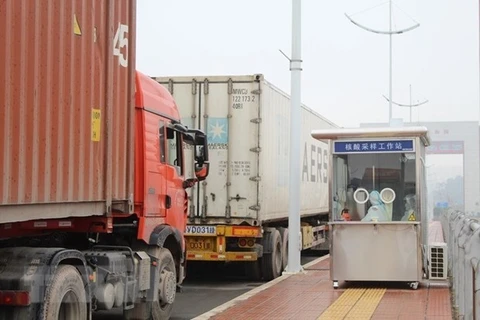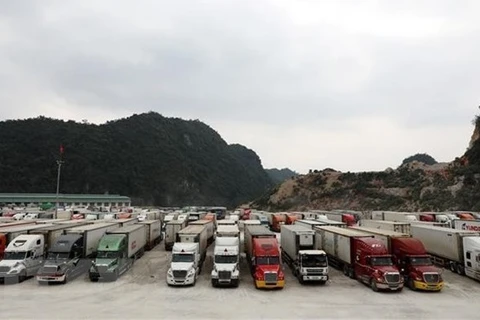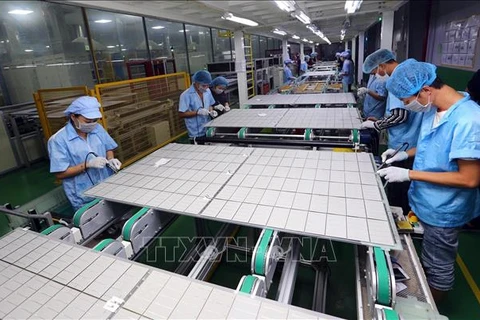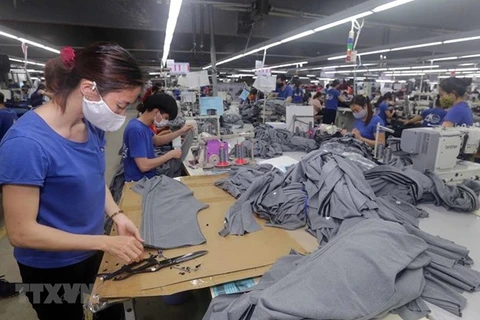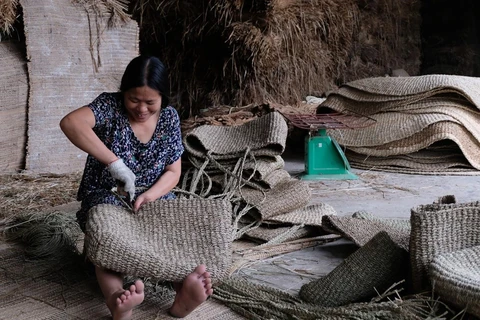 The two-year journey overcoming the "COVID-19 storm" is a revolution of PUN Coffee Company. (Photo: Collaborator/VietnamPlus)
The two-year journey overcoming the "COVID-19 storm" is a revolution of PUN Coffee Company. (Photo: Collaborator/VietnamPlus) Hanoi (VNA) – More than two years since the COVID-19 pandemic first appeared, and with no sign it will end in the near future, the government switched its COVID-19 prevention and control strategy to adapting and safely living with the pandemic.
Instead of avoiding and hibernating, many domestic enterprises have sought ways to turn the pandemic into a boost to change themselves and the challenges into the strength to pursue sustainable production and business.
Swift, drastic response
COVID-19 has made traditional orders halted, global supply chains disrupted and transport costs sharply rose, forcing domestic enterprises to find out viable and suitable solutions to 'live together' with the pandemic.
For Viet Trang Production and and Export Co. Ltd. in the central province of Thanh Hoa, its Business Director Mai Thi Anh Dao said the company established a swift response team, comprising leaders, designers, supply chain managers and artisans.
After six weeks, the team created a new product called “Fold To Fit". The new product provided an eye-catching design, environmentally friendliness, feasibility in production and smaller space for transport. The product cut down 90 percent of transport costs among countries and is suitable for online sale, helping to reduce storage and transport fees to customers by 80 percent and at least 50 percent, respectively.
“With this solution, we not only created a boost for our company but also received a positive response from our partners. The result marked an important milestone in the process of building a creative, professional and reliable image of our company,” Dao said.
Luong Thi My Hue, a representative of Tay Nguyen (Central Highlands) Medicinal Herb Co. Ltd., said the company had no choice but to develop further because there were livelihoods of tens of households behind it.
The company’s leadership embarked on rebuilding its business strategy and optimising expenditures in order to maintain production activities.
Thanks to this orientation, the company’s revenue grew remarkably, sometimes reaching 1 billion VND (43,000 USD) per month. At its peak, more than 20 female workers of the company had to continuously increase work shifts, Hue said.
For PUN Coffee Company, its director Phan Hong Phong described the two-year journey of overcoming the COVID-19 storm as a revolution.
Khe Sanh coffee products of PUN Coffee were made public when the fourth wave of COVID-19 infections hit the country and swept away many previous achievements of the company. Ho Chi Minh City, Hanoi, Da Nang and many provinces and cities across the country had to apply social distancing measures, forcing cafes to close their doors.
During the two years of the pandemic, PUN Coffee noticed that the consumption habits of society began changing. People moved towards the environment and green agriculture. Sustainable coffee growing needed to be stepped up and PUN Coffee promoted the building and restoration of material areas, using microbiological fertilisers made from coffee husks and biological waste, and pesticides produced from soapberry and sapele leaves.
 Viet Trang Production and and Export Co. Ltd connects to its customers via online tools (Photo: Collaborator/VietnamPlus)
Viet Trang Production and and Export Co. Ltd connects to its customers via online tools (Photo: Collaborator/VietnamPlus) Multimedia marketing
The adverse impacts of the pandemic pushed businesses in a new direction and changed the taste of consumers, as the traditional market access methods became unsuitable.
Dao said that with digital marketing methods and the initiative to improve its product ‘Fold To Fit’, Viet Trang Company successfully turned challenges into an opportunity amid the crisis.
Before the COVID-19 pandemic appeared, the company’s export revenue mainly came from its traditional business channel, accounting for 95 percent of the total. However, during COVID-19, all sales and trade promotion activities of the company were conducted online. The move helped Viet Trang Company not only retain its old customers but also approach an additional 20 percent of new clients, causing revenue to rise by 30 percent.
“Digital marketing now is no longer a choice. We turned it into a competitive advantage,” Dao said.
Digitalisation of administration system
Dr Nguyen Duc Khuong, a member of the Prime Minister’s economic advisory group, recommended domestic enterprises better adapt to the challenges by developing digital capacity and digitalising supply chains.
Meanwhile, Chairman and CEO of Phuc Sinh Corporation Phan Minh Thong said private companies that want to improve competitive capacity need to invest in administration software, with the focus placed on humans./.
